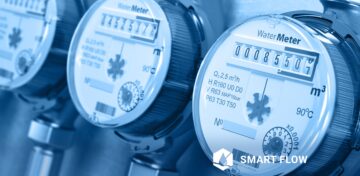

SMART WATER MANAGEMENT
What is a smart water meter?

Smart water meters, while functioning similarly to traditional ones by monitoring water flow, offer numerous benefits. These advantages include real-time data, wireless connectivity, smart analytics, actionable insights, and the elimination of manual readings. These features empower businesses, including the hospitality industry, to track water usage and costs in real-time. This article provides an in-depth comparison of water loggers, water meters, and the distinctions between utility meters, AMR, and the latest AI-powered smart water meters.
Traditional Water Meters
What is a traditional water meter?
A water meter measures the amount of water passing through a specific point, making it a valuable tool for assessing usage and calculating bills. These meters are also used to monitor energy and gas consumption. Traditional water meters operate on two principles: rate of flow and volumetric.
- Rate of Flow Meters: These meters use a propeller to measure water flow, with the propeller’s speed corresponding to a specific flow rate. A counting mechanism tallies the propeller’s revolutions, displaying the water consumption.
- Volumetric Meters: Volumetric meters feature a rotating container with a set capacity submerged in water and then emptied. The number of rotations indicates the water passing through the meter.
Various types of conventional water meters are employed, including impeller meters, Woltmann meters for industrial use, and Venturi meters, which rely on flow velocity variations.
Water Utility Companies’ Smart Meters (AMR)
Smart meters or Automated Meter Reading (AMR) devices provided by water utility companies offer near-real-time monitoring of water consumption. These devices enable quicker billing and use AMR technology for easier meter reading. However, the main benefits accrue to utility companies, not end consumers, both domestic and commercial.
AMR systems feature endpoints linked to meter encoder registers, facilitating communication between buyers and providers. While AMR eliminates the need for human meter readings, it typically records data daily or at 30-minute intervals, lacking the real-time capabilities of AI-powered alternatives.
Smart Meter Technology from Superfy and SMARTFLOW
As part of our product tier to combat a world of waste, Superfy and SMARTFLOW provide revolutionary smart water meter technology that empowers end users with real-time water monitoring and visibility of water usage. Unlike AMR, Superfy and SMARTFLOW utilizes artificial intelligence to provide total control and insights, enabling businesses to monitor their water usage 24/7 in real time. Research indicates that our clients have achieved a minimum 30% reduction in water consumption, aligning with their sustainability goals.
Pros of using smart meter technology:
- Accurate Readings: Smart water meters offer precise readings, ensuring users are billed only for the water they use.
- Sustainability and Water Conservation: These meters raise awareness of water usage, detect irregularities, and identify leaks, contributing to water conservation.
- Cost Savings: Real-time data access allows users to monitor water usage, resulting in reduced water bills.
- Leak Detection: Smart meters promptly detect spikes in water consumption, aiding in early leak detection.
- Short ROI Period: The initial cost of smart water meters is offset by savings in leakage control, network management, and reduced reliance on alternative water sources, resulting in long-term cost reductions for users.
In summary, smart water meters offer enhanced accuracy, sustainability benefits, cost savings, and rapid return on investment, making them a valuable choice for commercial businesses looking to manage water usage efficiently.